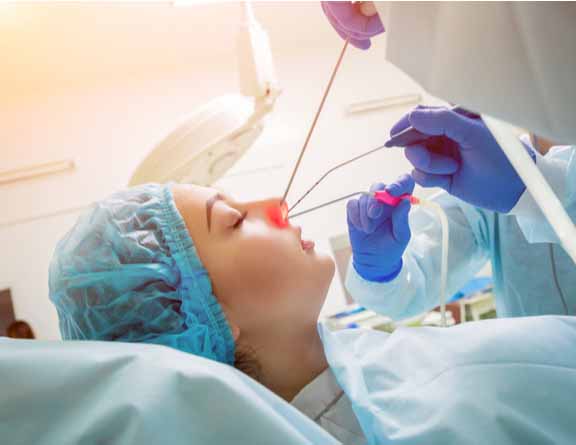
Bangalore
USFDA-Approved Procedure
Support in Insurance Claim
No-Cost EMI
Same-day discharge


Sinusitis Treatment - Diagnosis and Procedure
Diagnostic procedures required for sinusitis treatment
One of the most important criteria for diagnosing sinusitis is a medical history and physical examination. Your doctor will collect a detailed medical history, along with your symptoms, their severity, duration, recurrence, etc., to determine whether you have acute or chronic sinusitis.
Other diagnostic tests that help diagnose the presence and severity of sinusitis are:
Treatments for chronic sinusitis in Bangalore
In contrast to conventional surgery, FESS is less invasive and promises better recovery with minimal scarring. It is usually performed under local anesthesia. The surgical instruments are inserted through the nose to preserve aesthetic appearance. The infected sinuses are located, drained and then washed using a saline solution. After all the infected tissue is removed, the incisions are closed.
If you are suffering from either acute or chronic sinusitis, you should consult the best ENT specialist near you for appropriate treatment. Pristyn Care is aligned with the best ENT doctors in Bangalore to provide the best treatment to all patients.
Best ENT Clinics For Functional Endoscopic Sinus Surgery
At Pristyn Care, you can avail advanced sinus surgery with a microdebrider for better results and quicker recovery with low chances of recurrence.
At Pristyn Care, we have ENT surgeons with 8-10 years of experience in performing advanced FESS surgery with successful results.
FESS surgery at Pristyn Care has a success rate of over 95%, thanks to our advanced treatment facilities, expert surgeons, and state-of-the-art treatment centers.
At Pristyn Care, you can avail pre and postoperative consultations along with diagnostic endoscopy for diagnostic confirmation and treatment planning. You will also receive follow-up checkups with your ENT surgeon after surgery.
We have several experienced and highly rated doctors for Fess in Bangalore. Some of our top specialists include: Dr. Manu Bharath (16 Years Experience Overall), Dr. Madhu Sudhan V (13 Years Experience Overall), Dr Trupti Umesh Bhat (9 Years Experience Overall), etc.
After sinus surgery, you can return to work within 1 week of the surgery, however, if your work entails physical labor, you may need to wait 4-5 weeks before returning to work. A patient can resume their regular routine within 3 weeks of the surgery. You may have to visit your ENT specialist for follow-up visits for 3-4 months to ensure there is no recurrence.
FESS cost in Bangalore ranges from Rs. 45,000 to Rs. 70,000, based on a few factors such as choice of hospital and doctor, cost of diagnostic tests and other preoperative procedures, insurance coverage, etc. This cost includes all the pre and post-operative costs required for sinusitis treatment.
However, this cost can vary in case of postoperative complications, or if the patient has severe comorbidities, etc.
FESS surgery is very effective in relieving sinusitis symptoms as it directly targets the symptomatic areas. Since the surgery is performed using an endoscope, it is very precise. However, proper aftercare is required after the surgery to ensure that the effects of sinusitis treatment can are permanent.
FESS is usually covered by most major insurance providers. However, the extent of the coverage depends on the terms of the policy. Pristyn Care has a dedicated insurance team that can help you with the entire insurance documentation and claim process.
FESS is generally a very safe technique. Since it is performed using an endoscope, the chances of operative injury to the surrounding tissues are rare. The success rate of the surgery is as high as 80-90%.
Yes. One of the rare complications of sinus surgery is further sinus obstruction to adhesion of the sinus. In such a case, a revision sinus surgery is performed to clear the air pathways and provide better results than the initial sinus surgery.
Although rare, there are certain side-effects of endoscopic sinus surgery, such as:
In case you are experiencing heavy bleeding from the nose, high fever, sharp pain in the head, or increased swelling of the nose with clear fluid drainage (CSF leakage), you should contact your ENT doctor immediately.
FESS is performed under either general or local anesthesia, as such, the surgery is not painful. However, depending on the extent of the sinus infection, there may be mild to moderate pain after the surgery that generally feels like a blocked sinus. Pain after sinus surgery lasts for about a week and is managed through over-the-counter pain medications and anti-inflammatories.
Sinus surgery is a major operation. Generally, even chronic sinusitis patients are not recommended sinus surgery till conservative treatments such as medicines and lifestyle modification habits have become ineffective.
Generally, a FESS procedure lasts for about 2-2.5 hours, although this time range can vary a lot depending on which sinuses are infected and how much the infection has spread.
Yes, if you have a badly deviated septum or a nasal septum perforation, then septoplasty may be necessary to prevent chronic sinusitis. However, if that is not the case, then septoplasty may not benefit you too much in preventing recurrent sinus infections.
Sinus issues can be very persistent, i.e., they can easily return even after sinus surgery, however, their recurrence rates are highly variable and depend on the patient themselves. According to research conducted by BMC (BioMed Central), the recurrence rates for sinusitis after FESS ranges from 4% to 60%, with a median of 20% over a two-year period.
10 tips you can follow to avoid the recurrence of sinus infections are:
If left untreated, chronic sinusitis can cause serious complications.
Proper postoperative care is an important part of the recovery process. To improve recovery after the surgery, you should follow the given instructions:
| Sr.No. | Doctor Name | Registration Number | Ratings | Experience | Address | Book Appointment |
|---|---|---|---|---|---|---|
| 1 | Dr. Manu Bharath | 92419 | 5.0 | 16 + Years | Marigold Square, 9th Cross Rd, JP Nagar, Bengaluru | Book Appointment |
| 2 | Dr. Madhu Sudhan V | KMC 95346 | 4.5 | 13 + Years | 80 Feet Rd, near CMH Hospital, Indiranagar, Blr | Book Appointment |
| 3 | Dr Trupti Umesh Bhat | 186631 | 4.5 | 9 + Years | 449/434/09 ,Behind Kanti Sweets,Bellandur Doddakannelli Road, Outer Ring Rd, Bellandur, Bengaluru, Karnataka 560103 | Book Appointment |
.svg)
.svg)